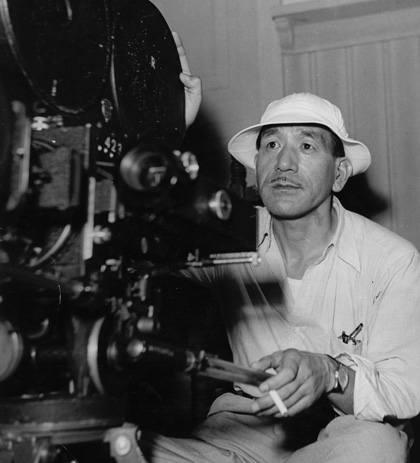FLOATING WEEDS
A film by Yasujirô Ozu
1959/ Japan/ 119 minutes
5.45 pm / 4th Sept/ 2016 / Perks Mini Theater
Sooner or
later, everyone who loves movies comes to Ozu. He is the quietest and gentlest
of directors, the most humanistic, the most serene. But the emotions that flow
through his films are strong and deep, because they reflect the things we care
about the most.“Floating Weeds” (1959) is like a familiar piece of music that
you can turn to for reassurance and consolation. It is so atmospheric--so
evocative of a quiet fishing village during a hot and muggy summer--that it
envelops you. Its characters are like neighbors.
A panoramic,
low angle opening montage of an idyllic Japanese coastal province defines the
understated, cinematic poetry of Yasujiro Ozu: a lighthouse framed against a
tranquil sea; docked boats undulating with the sweeping waves; villagers
weaving lackadaisically through local shops, as much for social interaction as
for commerce.
A struggling, itinerant acting troupe arrives into town for a
kabuki show, lead by an aging performer, Master Komajuro . It is a tenuous
homecoming for Komajuro. Ozu expertly weaves the narrarative through Komajuro's
life, his women, his son and unexpected
setbacks that he faces.
Ozu's pervasive
use of low camera height provides more than just a directorial signature style
in Floating Weeds. As in Tokyo Story, the atmosphere is intimate and
accessible. The characters appear grounded, human, reflecting Ozu's respect for
the dignity of the common man. The camera does not wander, but retains focus on
the space, creating a unbiased perspective of the characters.
Inevitably, we
understand Komajuro because he is all too human: the aging actor at the
twilight of his career; the leader faced with the dissolution of his failed
troupe; the father ashamed to reveal his deception. He has transcended the
great samurais of his struggling plays, stripped of their cosmetic facade, and
is rewarded with compassion and humanity. "Nothing is constant under the
sun," someone observes, and this is very much a film which acknowledges
the transience of human lives.
Ozu was born
on December 12, 1903 in Tokyo. He and his two brothers were educated in the
countryside, in Matsuzaka, whilst his father sold fertilizer in Tokyo. Ozu
developed a love of film during his early days of school truancy, but his
fascination began when he first saw a Matsunosuke historical spectacular at the
Atagoza cinema in Matsuzaka. Ozu's uncle, aware of his nephew's love of film,
introduced him to Teihiro Tsutsumi, then manager of Shochiku. Not long after,
Ozu began working for the great studio—against his father's wishes—as an
assistant cameraman.
Yasujirô Ozu
Ozu's work as
assistant cameraman involved pure physical labour, lifting and moving equipment
at Shochiku's TokyoThe Sword Of Penitence that became his first film as
director (and only period piece) in 1927. Ozu was called up into the army
reserves before shooting was completed. No negative, prints or script exist of
The Sword Of Penitence—and, sadly, only 36 out of 54 Ozu films still exist.
studios in Kamata. After becoming assistant director to Tadamoto Okubo, it took
less than a year for Ozu to put his first script forward for filming. It was in
fact his second script.
Days Of Youth
(Wakaki Hi, 1929) is Ozu's earliest extant picture, though not especially
typical (and preceded by seven others, now lost) as it is set on ski slopes.
Stylistically it is rife with close-ups, fade-outs and tracking shots, all of
which Ozu was later to leave behind. Three years later came what is generally
recognized as Ozu's first major film, I Was Born, But... (Umarete wa Mita
Keredo..., 1932). This moving comedy/drama was a great success in Japan both
critically and financially. It was one of cinema's finest works about children.
Thirty years into his filmmaking career Ozu was making films which, like
Kurosawa's Ikiru (1952), questioned the sense of spending your whole working
life behind a desk—something that many of his audience must have been doing.
Ozu's films represent a lifelong study of the Japanese family and the changes
that a family unit experiences. He ennobles the humdrum world of the
middle-class family and has been regarded as “the most Japanese of all
filmmakers”, not just by Western critics, but also by his countrymen.










No comments:
Post a Comment